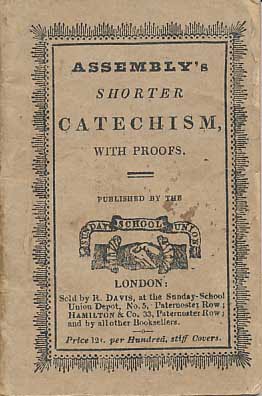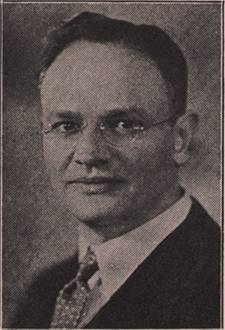This Day in Presbyterian History :
The Main Purpose for Life
It seems there are noteworthy people and events to point to for every day of the calendar. But for this day of January 13, we would instead like to turn our attention to the magnificent answer of our Confessional fathers in The Westminster Shorter Catechism, Question no. 1. — What is man’s chief end? Answer: Man’s chief end is to glorify God and to enjoy him forever.
 The framers of this short answer were concerned about the “chief” end of man. There could, and should, be other purposes for both faith and life. Indeed, every person, and certainly every Christian, should be aware of these purposes as they relate to life in the home, vocation, the church, and society at large. When changes come into your life, such as a birthday, anniversary, a new calendar year, or even the anniversary of conversion, a time of self-examination is afforded to assess progress in fulfilling these purposes. But in and through all of these milestones, this all-encompassing chief purpose should be your guide.
The framers of this short answer were concerned about the “chief” end of man. There could, and should, be other purposes for both faith and life. Indeed, every person, and certainly every Christian, should be aware of these purposes as they relate to life in the home, vocation, the church, and society at large. When changes come into your life, such as a birthday, anniversary, a new calendar year, or even the anniversary of conversion, a time of self-examination is afforded to assess progress in fulfilling these purposes. But in and through all of these milestones, this all-encompassing chief purpose should be your guide.
The first aspect of your chief and highest aim in life is “to glorify God.” Paul reminded the Corinthian Christians, “whether, then you eat or drink or whatever you do, do all to the glory of God.” (1 Corinthians 10:31 NASB) And that prince of Bible expositors, John Calvin, further defines this glory of God by stating that “the glory of God is when we know that He is.” But beyond seeing the divine glory in the revelation of Who He is as Creator and Redeemer, we are also given an answer as to how are to respond in our glorification of God.
» An edition of the Westminster Shorter Catechism, published by the London Sunday-School Union. J. Rider, Printer, Little Britain, undated [ca. 1803-1810], 63 p.; 10.3 cm. »
Jesus prayed in His high priestly prayer, “I glorified Thee on the earth, having accomplished the work which Thou has given me to do.” (John 17:4) Jesus reflects on his ministry, considering how He had fulfilled His eternal purpose in coming to earth. Likewise, our chief end in glorifying God is to finish the work which God’s Spirit has called us to do, in the home, our calling in life, through the church, and in society at large.
Our other chief purpose in life is to enjoy God forever. The psalmist Asaph meditates on this aim when he wrote, “Whom have I in heaven but Thee? And besides Thee, I desire nothing on earth.” (Psalm 73:25) We are to delight in our God on earth as we shall do in heaven. That translates out to delighting in God’s Word, the Bible, by worshiping Him publicly and privately, enjoying His day, the Christian Sabbath, set aside for Him, and fulfilling our calling as spiritual sons and daughters of God in the family, our calling in life, through the church, and in the world at large.
Words to Live By: By memorizing this answer, the reader will be able to do a quick check of this chief purpose in the words, thoughts, and actions of his/her life. Use this time of reflection in some meditation, then prayer, and then action to resolve to glorify God and enjoy him this day, tomorrow, the next day, and into the next week, month, and year.
Through the Scripture: Genesis 40 – 42
Through the Standards: Proof Texts of Holy Scripture:
Hebrews 1:1 “Long ago, at many times and in many ways, God spoke to our fathers by the prophets . . . (ESV)
Matthew 4:4 “But He (Jesus) answered, ‘It is written, Man shall not live by bread alone, but by every word that comes from the mouth of God.'” (ESV)
Luke 24:27, 44 “And beginning with Moses and the Prophets, he (Jesus) interpreted to them (his apostles) in all the Scriptures the things concerning themselves. Then he said to them, ‘These are my words which I spoke to you while I was still with you, that everything written about me in the Law of Moses and the Prophets and the Psalms must be fulfilled.” (ESV)
2 Peter 1: 21 “For no prophecy was ever produced by the will of man, but men spoke from God as they were carried along by the Holy Spirit.” (ESV)
2 Timothy 3:16, 17 “All Scripture is breathed out by God and profitable for teaching, for reproof, for correction, and for training in righteousness, that the man of God may be competent, equipped for every good work.” (ESV)
Isaiah 8:20 “To the teaching and to the testimony! If they will not speak according to this word, it is because they have no dawn.” (ESV)
John 10:35 “So men . . . to whom God’s message came — and the Scripture cannot be set aside or canceled or broken or annulled –” (Amplified Bible)
Further reading on man’s chief end—there are many passages we could relate, but this from Richard Sibbes is a recent favorite:
“. . . let us never rest till we make it good that God is our God. For what if we have all things, if we have not God with all things? All other things are but streams; God is the fountain. If we have not the spring, what will become of us at last? Ahithophel had much wisdom and policy, but he had not God for his God. Ahab had power and strength, but he had not God for his God. Saul had a kingdom, but he had not God for his God. Herod had excellence, but he had not God for his God. Judas was an apostle, a great professor, but he had not God for his God. What became of all these? Wisdom they had, strength they had, honour they had, friends they had, but they had not God; and therefore a miserable end they made. What miserable creatures are all such, when they shall say, Friends have forsaken me, wealth has forsaken me, and health has forsaken me; terrors lay hold upon me, the wrath of God has overtaken me. But they cannot say, God is my God. Oh, such are in a miserable case, in a fearful estate indeed. Nay, suppose they have all these, suppose they could say they have a world of riches, they have inheritances, they have friends, etc., yet if they cannot say, God is my God, all is vanity. The whole man is this, to have God to be our God. This is the whole man, to fear God and keep his commandment, Eccles. 12:13. If a man have all the world, and have not God for his God, all is but vanity and vexation of spirit. Never rest therefore till we can prove ourselves to be in the covenant of grace, till we can say, God is our God.”
[The Faithful Covenanter, by Richard Sibbes, Works, vol. 6, pp. 15-16.]
Also on this day:
In 1868, plans were laid for the Presbyterian Hospital in New York City.




